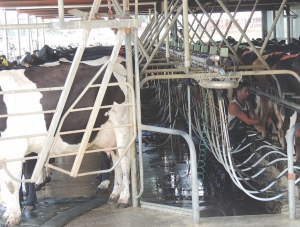If not, you could be in breach of the Health and Safety in Employment Act 1992.
And it’s not just briefing that’s required: all practicable steps to prevent infection from such a disease must have been taken. That means provision of protective clothing and vaccination of the herd.
Equally, just because you’ve vaccinated your herd, that doesn’t mean the risk is eradicated, as a paper in the January 24 issue of the New Zealand Medical Journal shows. It discusses the cases of three staff on a Wairarapa dairy farm who contracted the disease, two of whom required hospital treatment.
Report lead author Margot McLean, Medical Officer of Health, Regional Public Health, Hutt Valley
DHB says people should be in no doubt about the seriousness of the disease, which can cause kidney failure, haemorrhaging, heart arrhythmia, meningitis and jaundice.
“It can be fatal but there haven’t been many deaths in New Zealand from it because it gets treated fairly vigorously.”
But even a mild attack causes flu-like symptoms with headaches, fever, coughing, aching calves and lumbar region, vomiting, abdominal pain, diarrhoea and photophobia. Symptoms can persist several weeks.
The flu-like nature of mild cases, and because the disease may not be on some GPs’ radar, especially those in urban practices, means it’s likely many cases go unreported, despite the disease being notifiable. McLean says some studies have suggested incidence may be 20 to 40 times higher than reported.
“GPs in rural areas are more aware of it but it’s still not a very common disease… If you think there’s a risk you might have leptospirosis, you should mention that to your GP.”
Personal protective equipment for those working in risk environments, such as the milking shed, should include gloves, aprons, and, the NZMJ article argues, face protection.
McLean suggests a visor similar to those meatworkers wear “could be useful.”
“It depends on the risk on a particular farm: what the milking shed is like and what the likelihood of getting splashed with urine is, and how confident you can be about the vaccination status of the herd.”
In the cases detailed in the NZMJ, the herd had been vaccinated but some cows brought-in at the last minute had slipped through the net.
Covering cuts and grazes when milking, and thorough washing of hands before eating or smoking is also advised.
Co-author of the NZMJ article, Wairarapa vet Caleb King says provide disposable towels, rather than a conventional one, at the dairy shed.
“A reusable towel in the dairy shed to my mind is a no-no. One person might use it to wipe urine and faeces off their arm, then the next person might use it to wipe their face.”
Another all too frequent gap in the defence is failure to treat animals introduced to the herd with antibiotic as well as vaccine.
“If all you do is vaccinate, it doesn’t stop an already infected animal from shedding bacteria. If you’re serious about protecting your people from leptospirosis then you have to treat brought in cows with antibiotic.”
The problem with that is the cost: it’s about $30/cow on top of the $1.40/cow cost of the vaccine, and milk has to be withheld. However, compared to the cost of labour lost if a staff member contracts the disease, and subsequent treatment of the whole herd with antibiotic and vaccine as would be necessary in the wake of an outbreak, it’s a small price to pay, he suggests.
Vaccination has to be annual to keep the disease at bay, with two jabs four weeks apart the first time an animal is vaccinated. However, advice about when to start vaccinating young stock has changed, notes King.
“For calves in a high challenge situation start at six weeks, give a booster at 10 weeks and a third booster at six months of age. For all other farms start vaccinating calves

















